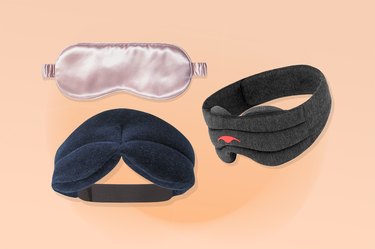
If you have tinnitus — that is, an unexplained ringing sound or other noises in one or both ears — you know the frequent, unwelcome noise can be distracting. That's especially true when you're trying to sleep.
"With sleep, it's supposed to be quiet time. There's no inherent background noise to help mask the ringing or buzzing," says Dennis Colucci, AuD, a board-certified audiologist in Dana Point, California.
Video of the Day
Video of the Day
So it may come as no surprise that more than three-quarters of people with tinnitus report having trouble falling or staying asleep, waking up too early or feeling tired during the morning or throughout the day, according to an April 2022 review in Brain Communications. To make matters worse, sleep deprivation can intensify tinnitus symptoms, Colucci says.
Fortunately, there are ways to cope with the unwanted sounds throughout the night. Here, experts share their advice on how to sleep with tinnitus and get more of the rest you need.
1. Get Serious About Sleep Hygiene
Whether or not you have tinnitus, setting the stage for a good night's rest can increase your odds for shut-eye success.
Amy Sarow, AuD, a board-certified audiologist in Southfield, Michigan, recommends establishing a consistent nighttime routine that helps you unwind before bed. "One to two hours prior to sleep, spend time doing relaxing activities like journaling, taking a bubble bath or listening to soothing music," she says. Reading or meditating can help, too.
Sleep experts also recommend the following to help you get better sleep:
- Keep the temperature cool in your bedroom (between 60 and 67° F).
- Make it dark; consider putting up blackout shades to nix ambient light.
- Turn off screens (including your phone) one to two hours before bed.
- Be consistent: Aim to go to bed and wake up at the same time every day, even on weekends.
What's the Best Sleeping Position for Tinnitus?
There doesn't seem to be one best sleeping position for everyone with tinnitus, but according to Mount Sinai, you can try propping your head into an elevated position. This can help ease congestion, which might make the noise less noticeable.
2. Run a White Noise Machine
One of the best tinnitus remedies is adding some background noise. When you add a steady hum to your bedroom, it can help drown out tinnitus sounds and make them less distracting, say Colucci and Sarow.
"If you light a candle in a dark room it stands out, but if you have a candle in a room with some light around it, it blends in much better. The same applies to masking noise," Sarow says.
A white noise machine can do the trick. One option, the LectroFan High Fidelity White Noise Machine ($32.45, Amazon) has 20 sounds to choose from and comes with a sleep timer. (Plus, it's better for you than sleeping with a fan on.)
And don't worry: There's no negative effects of using white noise for sleep.
3. Use a Sound Pillow or Sleep Earbuds
Both a sound pillow and sleep earbuds offer similar sound-masking benefits as white noise, but they can be less disruptive if you sleep with a partner or roommate who prefers silence.
Options like the Sound Pillow Sleep System ($159.88, Amazon) have speakers within the pillow itself, so the white noise gets funneled directly into the ear you're sleeping on.
Sleep headphones can also help block out excess noise. Sarow is a fan of Soundcore's Sleep A10 earbuds ($179.99, Soundcore.com)
4. Try Relaxation Strategies
For many, it's the stress caused by tinnitus, rather than the noise itself, that leaves them tossing and turning. "The anxiety around the noise starts to engage the body's fight-or-flight system," Colucci says. And the more revved up you get, the harder it becomes to relax and doze off.
Bedtime practices like progressive muscle relaxation can bring on a feeling of calm and improve sleep affected by tinnitus, found a July 2019 study in Auditory and Vestibular Research. "It involves tensing and releasing different muscle groups in the body and helps to release stress and tension," Sarow says.
Here's how to do it, according to the Centre for Clinical Interventions:
- Start in a comfortable position (like lying in bed), and give yourself permission to relax.
- Choose an area of the body to begin, such as your toes. Tense the muscles, making sure you feel tension but not pain, and hold for five seconds.
- Relax the muscles for 10 seconds.
- Move on to the next body part (i.e. your feet). It's often recommended to work from your toes up to your head, or vice versa.
5. Consider Therapy
Working with a therapist or audiologist can be helpful for managing more severe symptoms. One popular option is cognitive behavioral therapy, which has been shown to be more effective for tinnitus-related sleep problems than anti-anxiety medications, per a June 2017 paper in The Hearing Journal. "It can help separate the emotions from the presence of the tinnitus sound itself," Sarow says.
Tinnitus retraining therapy is another possible solution. A blend of counseling and sound therapy designed to change a person's auditory perception, it can help decrease the brain's response to tinnitus during the daytime or at night. And success rates are high, improving symptoms about 80 percent of the time, according to an April 2015 review in HNO.
What About Medications?
There's no cure for tinnitus, and there aren't any medications that can reduce or prevent ringing or buzzing when you're trying to sleep. "By and large, trying to handle the tinnitus psychologically is the first step," Colucci says.
But if you need more help relaxing while you're working on finding the right tinnitus management strategy, taking a supplement or medication may be helpful. "Some people take CBD, some take melatonin," says Colucci.
Keep in mind that it's always best to discuss with your medical provider what might be the best supplement for you. They'll also be able to advise you on how to use the supplement safely, especially if you're taking other medications.
In some cases, you and your doctor might decide you'd benefit from anti-anxiety medications or antidepressants, per the Mayo Clinic. "They can be successful, but they won't actually treat the tinnitus," Colucci says.
- Brain Communications: "Tinnitus: at a crossroad between phantom perception and sleep"
- Auditory and Vestibular Research: "The effects of cognitive-behavioral training and muscle relaxation on the degree of tinnitus and the quality of sleep"
- The Hearing Journal: "Insomnia and Tinnitus: A Worrisome Cycle"
- HNO: "25 years of tinnitus retraining therapy"
- Mayo Clinic: "Tinnitus"
- Centre for Clinical Interventions: "Progressive Muscle Relaxation"
- Mount Sinai: "Tinnitus"
Is this an emergency? If you are experiencing serious medical symptoms, please see the National Library of Medicine’s list of signs you need emergency medical attention or call 911.


